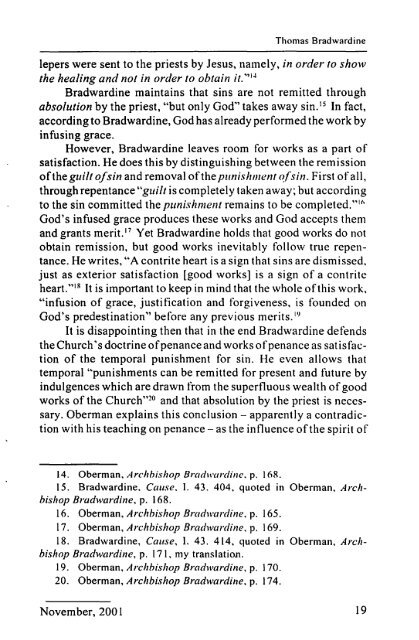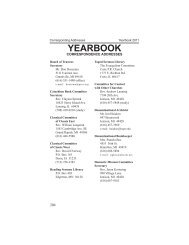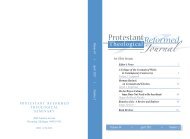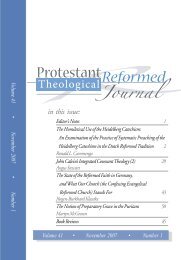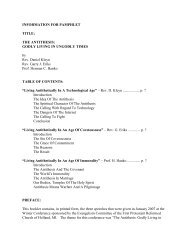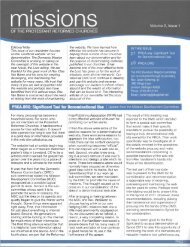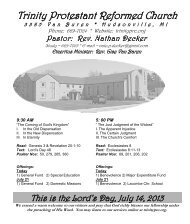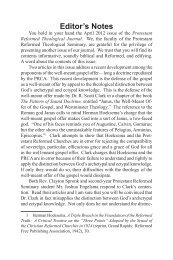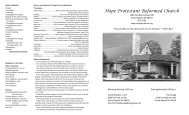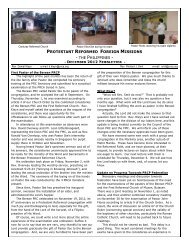Thomas Bradward<strong>in</strong>elepers were sent to the priests by Jesus, namely, <strong>in</strong> order to showthe heal<strong>in</strong>g and not <strong>in</strong> order to obta<strong>in</strong> it. "14Bradward<strong>in</strong>e ma<strong>in</strong>ta<strong>in</strong>s that s<strong>in</strong>s are not remitted throughabsolution by the priest, "but only God" takes away s<strong>in</strong>. ls In fact,accord<strong>in</strong>gto Bradward<strong>in</strong>e, God has already performedthe work by<strong>in</strong>fus<strong>in</strong>g grace.However, Bradward<strong>in</strong>e leaves room for works as a part ofsatisfaction. He does this by dist<strong>in</strong>guish<strong>in</strong>g between the remissionofthe guilt o/s<strong>in</strong> and removal ofthe punishment a/s<strong>in</strong>. First ofall,through repentance Hguilt is completely taken away; but accord<strong>in</strong>gto the s<strong>in</strong> committed the punishment rema<strong>in</strong>s to be completed."IhGod's <strong>in</strong>fused grace produces these works and God accepts themand grants merit. '7 Yet Bradward<strong>in</strong>e holds that good works do notobta<strong>in</strong> remission, but good works <strong>in</strong>evitably follow true repentance.He writes, "A contrite heart is a sign that s<strong>in</strong>s are dismissed,just as exterior satisfaction [good works] is a sign of a contriteheart."Ill It is important to keep <strong>in</strong> m<strong>in</strong>d that the whole ofthis work,"<strong>in</strong>fusion of grace, justification and forgiveness. is founded onGod's predest<strong>in</strong>ation" before any previous merits. II)It is disappo<strong>in</strong>t<strong>in</strong>g then that <strong>in</strong> the end 8radward<strong>in</strong>e defendsthe Church's doctr<strong>in</strong>e ofpenanceand works ofpenance as satisfactionof the temporal punishment for s<strong>in</strong>. He even allows thattemporal "punishments can be remitted for present and future by<strong>in</strong>dulgences which are drawn from the superfluous wealth ofgoodworks of the Church"20 and that absolution by the priest is necessary.Oberman expla<strong>in</strong>s this conclusion - apparently a contradictionwith his teach<strong>in</strong>g on penance - as the <strong>in</strong>fluence ofthe spirit of14. Oberman, Archbishop BradwardillC. p. 168.15. Bradward<strong>in</strong>e. Cause. I. 43. 404, quoted <strong>in</strong> Oberman, ArchbishopBradward<strong>in</strong>e, p. 168.16. Oberman, Archbishop Bradward<strong>in</strong>e, p. 165.17. Oberman, Archbishop Bradward<strong>in</strong>e, p. 169.18. Bradward<strong>in</strong>e, Cause, I. 43. 414, quoted <strong>in</strong> Oberman, ArchbishopBradward<strong>in</strong>e, p. 171, my translation.19. Oberman, Archbishop Bradward<strong>in</strong>e, p. 170.20. Oberman, Archbishop Bradward<strong>in</strong>e, p. 174.November, 2001 19
the age, namely, that hav<strong>in</strong>g set forth a number of positions, thetheologian would often bow to the teach<strong>in</strong>g ofthe Church. 21Bradward<strong>in</strong>e's Doctr<strong>in</strong>e of S<strong>in</strong>It is <strong>in</strong>controvertible that Bradward<strong>in</strong>e strove.to ma<strong>in</strong>ta<strong>in</strong>.thedoctr<strong>in</strong>es championed by August<strong>in</strong>e aga<strong>in</strong>st the Pelagians. And,though the emphasis <strong>in</strong> Bradward<strong>in</strong>e's theology was necessarilydifferent from August<strong>in</strong>e's due to development of the lie and thevarious approaches ofthe "Modern Pelagians," to a large degreeBradward<strong>in</strong>e was a faithful disciple ofAugust<strong>in</strong>e. This is not true,however, <strong>in</strong> one crucial doctr<strong>in</strong>e, namely, s<strong>in</strong>. In this areaBradward<strong>in</strong>e had a serious weakness.Bradward<strong>in</strong>e's weakness beg<strong>in</strong>s with his failure torecognizethe serious consequences of origi~al s<strong>in</strong>. With August<strong>in</strong>e, he seesall that exists as be<strong>in</strong>g good, <strong>in</strong> that it was created by God and has.form· and existence. Evil is the privation ofthe good. S<strong>in</strong> is, then,.not <strong>in</strong> the act itself, but <strong>in</strong> the motive. Forproofofthis, Bradward<strong>in</strong>eargues that, for example, homicide is not a s<strong>in</strong> as such, for then itwould be wrong to execute a murderer. But this leads Bradward<strong>in</strong>eto conclude that a violation ofGod's law done <strong>in</strong> ignoranc~ is nots<strong>in</strong> because the motives were not evil. That, August<strong>in</strong>e did not say.In fact, August<strong>in</strong>e <strong>in</strong>sisted that s<strong>in</strong>s ofignorance are a work<strong>in</strong>g outofthe horrible depravity of man because of Adam's fall.Bradward<strong>in</strong>e does not give evidence that he has a gr.asp ofthehorrible effect of Adam's fall. He speaks of the result ofthe fallusually <strong>in</strong> terms of the punishment that God put on man. That iscorrect, as such, but it is wholly <strong>in</strong>adequate. Oberman notes thatthe difference between Bradward<strong>in</strong>e and August<strong>in</strong>e is thatBradward<strong>in</strong>e does not have a view ofs<strong>in</strong> as a profound debt and aturn<strong>in</strong>g away from God. Oberman adds, '"It is obvious that whereBradward<strong>in</strong>e emphasizes too little the seriousness ofs<strong>in</strong>, this mustalso have consequences for the understand<strong>in</strong>g of God's overwhelm<strong>in</strong>glove <strong>in</strong> His grace.''1221. Oberman, Archbishop Bradward<strong>in</strong>e. pp. 176-177.22. Oberman, Archbishop Bradward<strong>in</strong>e, pp. J ~4.20 PRTJ·
- Page 1 and 2: ProtestantReformedTheologicalJourna
- Page 3 and 4: EDITOR'S NOTESProf. Russell J. Dyks
- Page 5 and 6: For there are many, even l unruly,
- Page 7 and 8: happen to hold unwittingly to some
- Page 9 and 10: tion oftheir false teachings. II Pe
- Page 11 and 12: est, they are very weak, at worst,
- Page 13 and 14: truth~' (see I Tim. 4: 1 - 4). Ever
- Page 15 and 16: Thomas Bradwardine:Forgotten Mediev
- Page 17 and 18: ated grace and uncreated grace. Unc
- Page 19: Bradwardine faces the question ofth
- Page 23 and 24: did not identify Thomas Bradwardine
- Page 25 and 26: The first is that Bradwardine was a
- Page 27 and 28: to Bradwardine as oneof"two pre-emi
- Page 29 and 30: Gospels, Acts, and Revelation. Sir
- Page 31 and 32: power of the papacy in Bradwardine'
- Page 33 and 34: The Serious Callof the Gospel -Is t
- Page 35 and 36: elieve th~s proclamation with uprig
- Page 37 and 38: to bring good news with their "fig
- Page 39 and 40: nation, we read of Melchisedek, the
- Page 41 and 42: official activity ofa monarch's her
- Page 43 and 44: 8): "Calling is ofthose elect and r
- Page 45 and 46: ut all his posterity unable to obey
- Page 47 and 48: alone, and He saves whom He will. E
- Page 49 and 50: have moved away from the notion oft
- Page 51 and 52: every member ofthe visible, institu
- Page 53 and 54: fulfilling this calling is their pa
- Page 55 and 56: contingent. Further, Calvin did not
- Page 57 and 58: ofacceptance in terms of merit, ins
- Page 59 and 60: covenant ofgrace and works, or it i
- Page 61 and 62: Spiritual, Suffers Them to DefileTh
- Page 63 and 64: the gospel is preached" (p. 212).In
- Page 65 and 66: "They do not hold that JesusChrist
- Page 67 and 68: II Corinthians 3:6 that "the letter
- Page 69 and 70: is to oppose and to repulsethat sec
- Page 71 and 72:
Rightly Divided: Readings inBiblica
- Page 73 and 74:
is necessary speaks volumesabout th
- Page 75 and 76:
Guilt, Grace and Gratitude,Lectures
- Page 77 and 78:
76ted under the new? If it wererigh
- Page 79 and 80:
er to keep himself holy; forthe Sab
- Page 81 and 82:
there is room for both positionsin
- Page 83 and 84:
Dr. Gannett's eschatologyalso effec
- Page 85 and 86:
that, but man has a corrupt nature(
- Page 87 and 88:
the love of God is "universal"(p. 5
- Page 89 and 90:
ever, throughout the book thereis n


